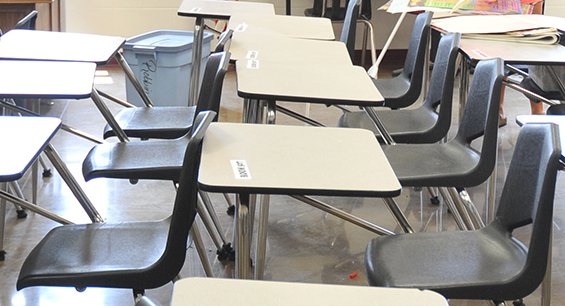Pretrial disclosure documents sent to a federal judge in a long-running Pulaski County school desegregation lawsuit indicate who the witnesses are likely to be and the arguments that will be made in an upcoming multi-week hearing.
U.S. District Chief Judge D. Price Marshall Jr., the presiding judge in the 37-year-old lawsuit, has set the July 14 hearing to determine whether the 12,000-student Pulaski County Special School District has met its school desegregation obligations and is entitled to be declared unitary, or desegregated, and released from future court monitoring.
Attorneys for the McClendon intervenors, who are the black students in the Pulaski County Special School District, are challenging the district's request for unitary status. Unitary status would entitle the district to be released to operate as other districts do -- without having to make regular reports to monitors and the judge.
In the newly submitted disclosure sheets the McClendon attorneys raise the possibility of adding to the district's obligations in the form of court-ordered replacement schools for the older College Station and Harris elementary schools as well as the newly built Mills High School and renovated Mills Middle School. All four schools are in the east and southeast parts of the district that have higher percentages of black and poor families as compared to the other parts of the widespread district.
"Intervenors seek the denial of PCSSD's Motion for a ruling of full unitary status and termination in the entirety of court supervision," the McClendon legal team wrote to Marshall. "Intervenors seek as well additional affirmative relief regarding at least the area of facilities."
The McClendon intervenors listed two dozen people -- including Superintendent Charles McNulty, School Board President Linda Remele and court-appointed desegregation expert Margie Powell -- as potential witnesses for their case at the hearing that will delve into the subjects of student discipline practices, student achievement and self-monitoring of desegregation efforts, as well as school facilities. The intervenors also submitted a list of some 78 exhibits to be presented to the just during the hearing.
Attorneys for the district told the judge that the district has complied with those obligations, which come from the district's desegregation Plan 2000 and subsequent agreements and court orders.
"PCSSD has demonstrated good-faith, substantial compliance with Plan 2000 as modified and amended," the school system attorneys told the judge.
And in contrast to the McClendon intervenors' contention that the district must do more to equalize the condition of its school buildings, attorneys for the district said the facilities requirement is the least complicated to address because of a later agreement among the parties and the judge. That was to replace Mills High and convert the old Mills into Mills Middle School for $55 million.
"The most straightforward determination to be made is on the issue of facilities, where this outcome is all but pre-ordained following the joint motion to amend Plan 2000 providing the $55,000,000.00 benchmark to achieving, by its own terms, 'full unitary status'," the district attorneys wrote.
The district offered its own list of potential witnesses for the July hearing, including some who are on the intervenors' list. The school district also submitted to the judge a 7-page list of documents, charts, graphs, diagrams that could be offered during the hearing as exhibits.
A small sample of those include information on student ACT Aspire test scores, master schedules for different schools, information on professional development, Powell's reports to the judge on desegregation compliance, discipline disproportionately work sheets, construction bid packages, and videos of Mills High and Robinson Middle school campuses.
In addition to facilities, attorneys for the district told the judge that the student achievement matter "is mostly controlled by prior stipulation" in which the intervenors agreed to the establishment of the Donaldson Scholars Academy as a substantial component of district's desegregation obligation achievement. The academy -- paid for by the district -- enabled high school students to do weekend and summer academic work in conjunction with the University of Arkansas at Little Rock and Philander Smith College. The purpose of the academy is to help students be better prepared for success in college.
"That program has now been implemented," they wrote. "Beyond the Donaldson Scholars Academy, there is still more than adequate evidence in the record to find that PCSSD is unitary on student achievement," they also said.
Attorneys for the Pulaski County Special School District are Sam Jones, Devin Bates, Amanda Orcutt, Jay Bequette and Cody Kees.
Attorneys for the McClendon intervenors are Austin Porter Jr., Robert Pressman, Shawn Childs and Lawrence Walker. The McClendon team, which submitted a list of some 78 exhibits to be presented to the judge during the hearing, renewed its complaint about the federal desegregation expert's "inadequate" reports. Those were largely supportive about the district's compliance with its obligations.
The McClendon lawyers argued that the Pulaski district falls short in compliance. In regard to achievement, the district is obligated, they argued, to meet goals cited by a former presiding judge in the case. They called for the district to improve the achievement of all students with special attention paid to black students at risk of academic failure; decrease the achievement gap between white and black students, and set up a school-by-school system for evaluating achievement.
The legal team told the judge that the district is relying on new or recent initiatives with limited student participants to achieve its academic goals. The team also pointed to the 2017 displacement of four district-wide curriculum staff members who were meant to ensure that the Plan 2000 obligations were pursued.
